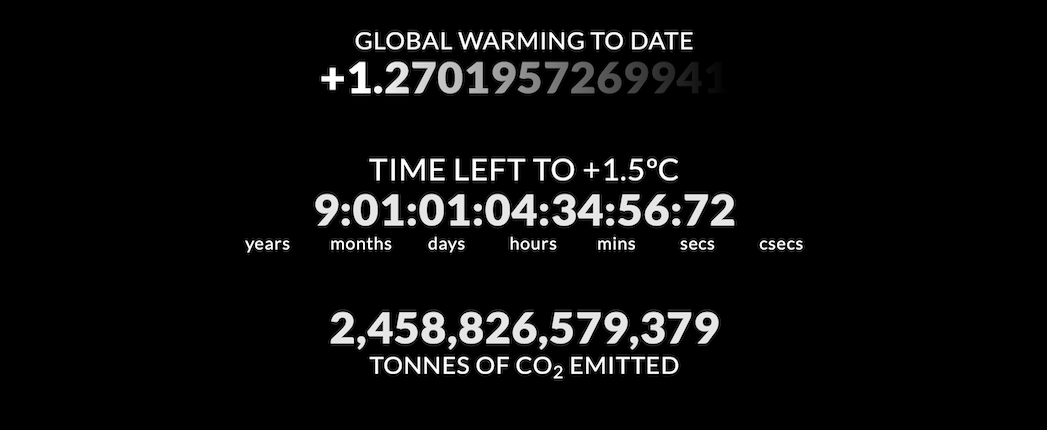
There are nine years left until global warming reaches 1.5 degrees Celsius above pre-industrial levels, according to the Climate Clock. As temperatures and carbon dioxide rise, the clock counts down to an ecological doomsday, when extreme weather events become the norm, ice sheets melt permanently, sea levels rise and coral dies.
Hosted by Concordia University and launched in 2015, the Climate Clock shows how fast we are approaching this devastating cutoff given current emissions trends, as well as global warming and CO2 emitted to date. The clock is updated yearly to account for the latest global CO2 emissions trend and rate of warming. Currently, the clock reaches zero by April 2032.
Almost all other scenarios for humanity’s near-term greenhouse gas emissions also predict global warming of 1.5 C between 2030 and 2035.
In its latest synthesis report presented on Monday this week, the Intergovernmental Panel on Climate Change (IPCC) says climate change is progressing faster and its consequences are more devastating than initially thought. The report calls for drastic measures to reduce CO2 emissions.
Climate scientists think the pace and scale of action to date, as well as current plans, are insufficient to address climate change. However, the international community could still achieve “a visible slowdown in global warming” with deep, rapid and sustained reductions in emissions.
To limit the increase in temperature to 1.5 C, or a maximum of 2 C, greenhouse gas emissions from all sectors must be drastically reduced before the end of this decade. The decisions made in this decade will have an impact on the next millennia, the synthesis report continues.
However, even in its two most-optimistic scenarios with very significant emission reductions, the IPCC assumes that warming will temporarily exceed 1.5 C.
The IPCC’s climate scientists note that public and private financial flows for fossil fuels are still larger than those for climate adaptation and mitigation. Yet even such a temporary overshoot would have irreversible consequences, such as melting glaciers or rising sea levels. At the same time, Council Chair Hoesung Lee stressed: “If we act now, we can still secure a livable and sustainable future for all.”
According to the UN, the world is heading for a temperature increase of up to 2.6 C, even with the pledges made so far to cut greenhouse gases. In 2015, the international community agreed in the Paris Climate Agreement to limit global warming to 1.5 C compared with the pre-industrial era. However, emissions are currently rising steeply instead of falling, even after a small decline due to the Coronavirus pandemic.
But global CO2 emissions would have to fall by 48% by 2030 compared to 2019 to limit global warming at 1.5 C. By 2035, emissions would have to fall by as much as 65% compared with 2019, according to the IPCC.
“Climate change is a threat to human wellbeing and the health of the planet,” the synthesis report says. Nearly half of the world’s population, around 3.6 billion people, live in regions that are likely to experience particularly severe impacts of climate change. Already, impacts such as more frequent and severe heat waves, floods and droughts are visible, such as the heat and floods in India and Pakistan in 2022 and the ongoing drought south of the Sahara.
UN Secretary-General António Guterres warned of the devastating consequences of climate change. “The climate time bomb is ticking. But today’s IPCC report is a guide to defusing the climate time bomb. It is a survival guide for humanity,” he said in a video chat at the launch of the synthesis report on March 20.
Guterres called for a leap in climate protection measures, such as the expansion of green energy and the acceleration of climate efforts in every country and across every sector. He also called on the developed nations to achieve climate neutrality by 2040, if possible. So far, Germany is aiming for this by 2045. Despite being five years after the recommended target year, the country is one of the world’s most ambitious.
It is now important to “take political responsibility for future generations,” said Viviane Raddatz of the World Wildlife Fund. Raddatz thinks that the IPCC report “unmistakably illustrates the already devastating effects of the climate crisis on humanity and ecosystems worldwide.” The report also clearly shows that “we can meet this colossal challenge if we act decisively now,” she said.
I say that for mankind The Final Countdown has begun, but unlike the 1980 American science fiction film of the same name, we don’t have an aircraft carrier that can take us back in time to change things before they even happen.
STAY SuSTAYnable!

Apu Gosalia is an adviser, partner and honorary lecturer in sustainability strategy

Sorry, a technical error occurred and we were unable to log you into your account. We have emailed the problem to our team, and they are looking into the matter. You can reach us at cs@lubesngreases.com.
Click here link to homepage